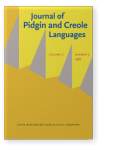Vol. 2:2 (1987) ► pp.119–147
The City, The Mesolect, and Innovation
Change in a creole or pidgin continuum is like linguistic change elsewhere: innovations that are identified with speakers who bear prestige are likely to spread, while innovations identified with speakers who do not bear prestige are not. In the case of the continuum that spans Liberian English (from pidgin to standard), the greatest prestige is assigned to acrolectal speakers, and decreolizing changes are the most frequent type. However, the urban mesolect has emerged as a secondary locus of prestige. Nonde-creolizing innovations that have arisen among speakers of this variety thus have the potential to spread, first to the rural mesolect, then to the two (rural) Liberian basilects. Four innovations, each at a different stage of diffusion, are examined, two involving feni (<finish) and two involving besne (<business).
Cited by
Cited by 6 other publications
This list is based on CrossRef data as of 5 july 2024. Please note that it may not be complete. Sources presented here have been supplied by the respective publishers. Any errors therein should be reported to them.
